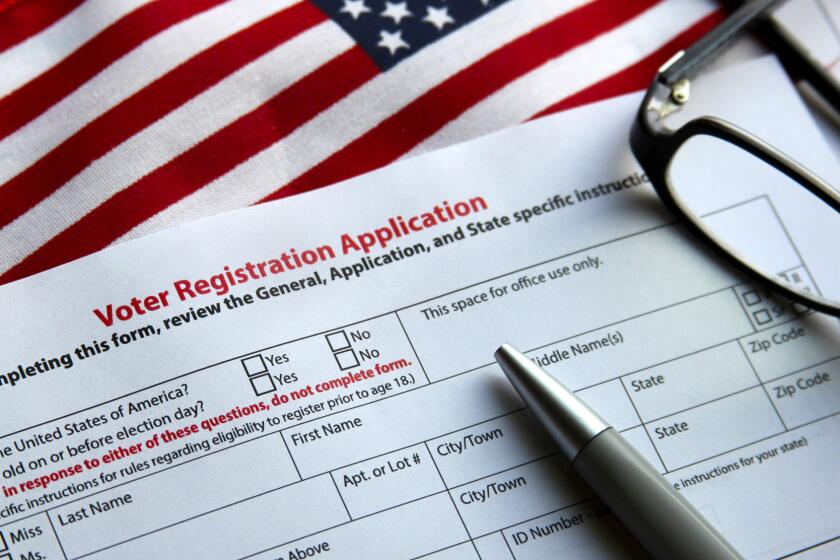
- Share via
- Many immigrants want to get citizenship in time to vote in the upcoming election.
- The Biden administration says the uptick in new citizens is due to efforts to reduce a backlog of applications that mounted during the COVID-19 pandemic.
RIVERSIDE — Hundreds of people from 63 countries packed into a Riverside theater last week to take the oath of citizenship. American flags lined the stage as messages conveying the immigrants’ new power played on a large screen:
“Today, I am an American. Today, I am a citizen of the country I serve. Today, I can register to vote.”
The 775 people who participated in the naturalization ceremony Sept. 19 are part of a wave of new U.S. citizens being sworn in across the country, as immigration authorities approve citizenship applications at the fastest speed in a decade.
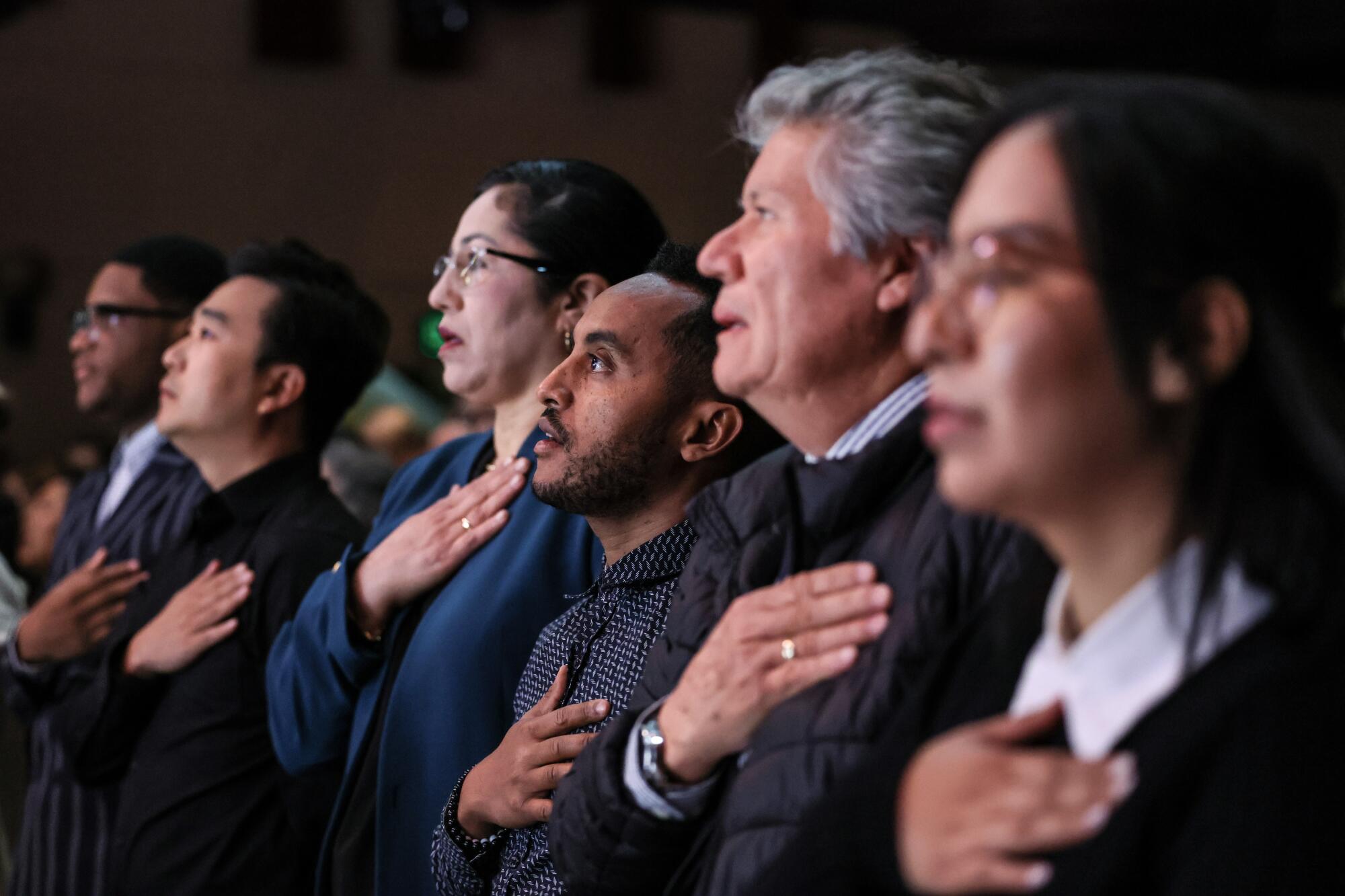
The Biden administration says the uptick in new citizens is due to efforts to reduce a backlog of applications that began during the Trump administration and exploded amid the COVID-19 pandemic. Immigration officials said the timing is not driven by the election or any political agenda.
The Department of Homeland Security “does not take actions based on electoral politics or upcoming elections. Period,” spokesperson Naree Ketudat said. She added that the agency has endeavored to process naturalization petitions within six months for decades.
Former President Trump and his Republican allies have long repeated baseless claims that Democrats are admitting immigrants into the U.S. for political gain and allowing them to vote unlawfully. The issue even made its way into the government spending bill this month when House Speaker Mike Johnson (R-La.) tried unsuccessfully to insert a GOP proposal to require states to obtain proof of U.S. citizenship when people register to vote.
Republicans are betting that raising illegitimate fears about noncitizen voting will resonate with voters frustrated by illegal immigration.
Only U.S. citizens can vote in federal elections, and it usually takes several years before immigrants with lawful status can apply for citizenship.
But it is typical for citizenship applications to spike during election years, and California is home to the largest number of lawful permanent residents who are eligible to become naturalized citizens. Thousands are doing so in time to cast votes in the Nov. 5 election.
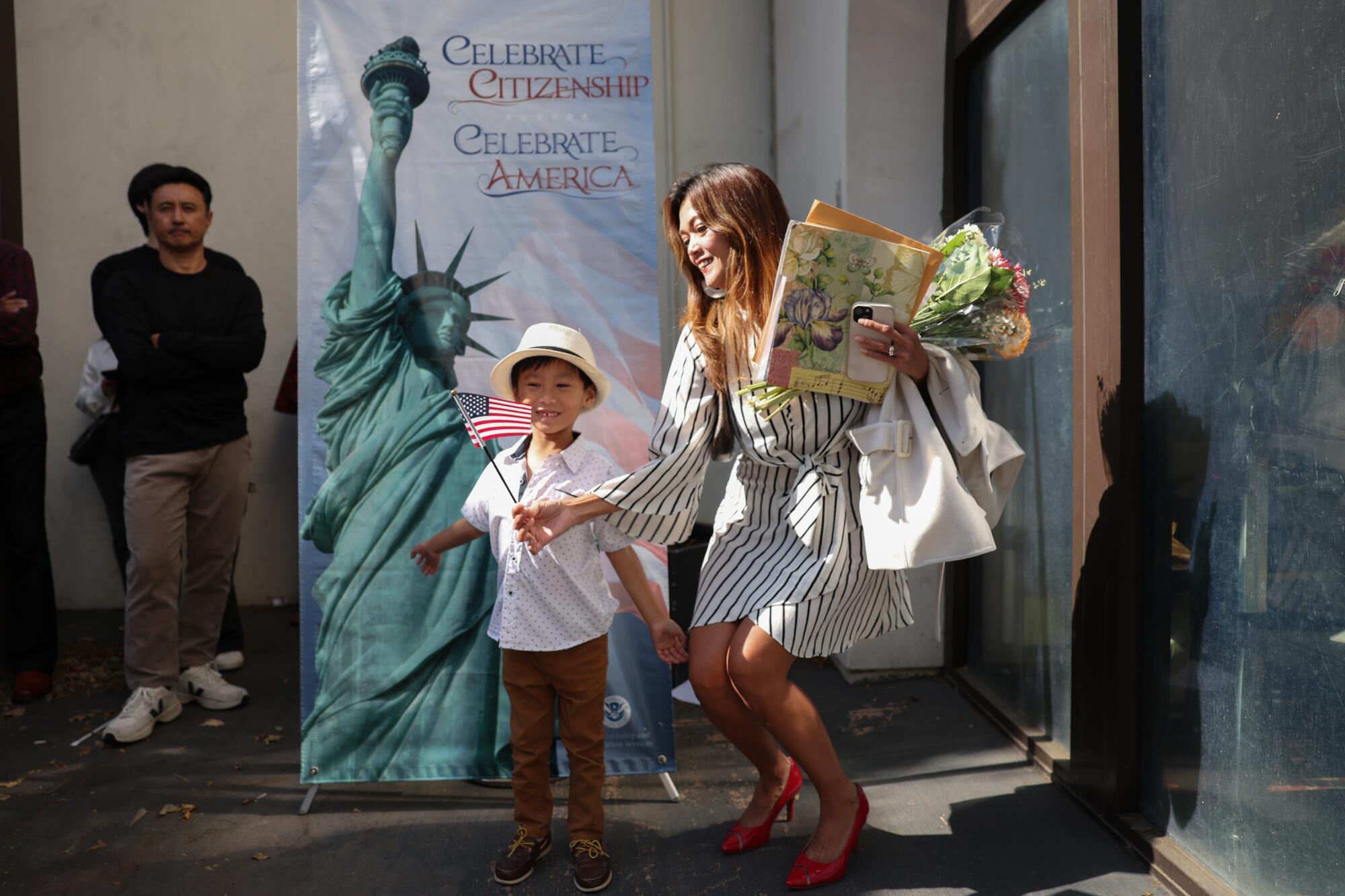
“In this particular election year, this bureaucratic efficiency is so politically fraught,” said Xiao Wang, co-founder of Boundless, a company that helps people navigate the immigration system and analyzes trends.
“This is not part of some master conspiracy to flood the country with new Democratic voters. There’s a lot of statistics that show many immigrants share more in common with Republican values.”
That was obvious at the citizenship ceremony in Riverside, where Victoria Van Valen, 54, was taking the oath. She had already filled out her voter registration form and just needed her naturalization certificate after the ceremony to make it official. Van Valen, who came to the U.S. from Mexico when she was 15, lived as a legal permanent resident for decades.
Recently she decided she wanted to become a citizen, in part so she could vote for president this year. She said she plans to vote for Trump, citing his tough stance on immigration and his economic policies and noting that home prices have soared in Southern California since his presidency ended.
“I was eager and excited to make it to this day before election day,” she said. “It’s an honor to exercise my freedom.”
A first-of-its-kind survey of more than 3,300 immigrants nationwide confounds some of the conventional wisdom surrounding their politics and partisanship.
Nearly 4 million immigrants have gained U.S. citizenship since the 2020 election, according to federal government figures. That’s a tiny fraction of the more than 158 million people who voted in 2020.
An additional 9 million people are eligible to naturalize, Wang said — though most of them are concentrated in California, New York, Texas and Florida, states that are not presidential battlegrounds — and are unlikely to attain citizenship before the election.
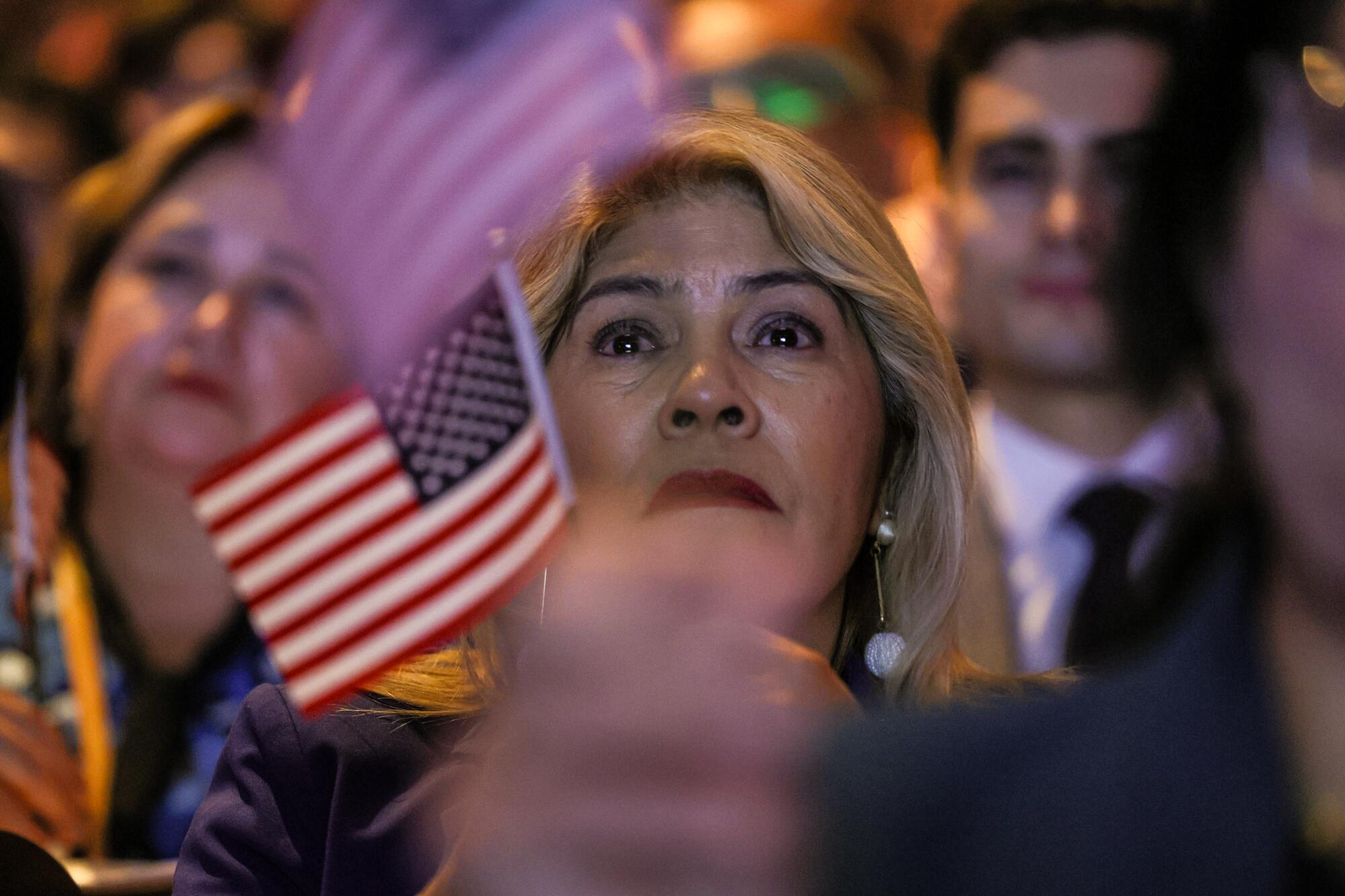
So how influential new citizens could be in the presidential election depends, like so much in this race, on which state they live in and whether they will vote. Their potential to shape the outcome is greatest in swing states with razor-thin margins.
“In Arizona, we keep talking about how there’s a 10,000-vote margin of victory,” said Nicole Melaku, executive director of the National Partnership for New Americans, referring to Joe Biden’s win there in 2020 by 10,457 votes.
“That vote share is growing and if people make sure that [naturalized] folks engage in this year’s election, they can make a significant difference.”
A poll released this month by the National Partnership for New Americans found that 97% of naturalized citizens in swing states plus California said they are likely to vote in the fall, while 76% said they definitely will vote.
The poll, conducted last month, surveyed 2,678 naturalized citizens who are registered to vote, plus an oversample of 200 more registered voters in each of California, Arizona, Florida, Michigan, Nevada and Texas. It was analyzed by the U.S. Immigration Policy Center at UC San Diego.
Naturalized voters account for about 10% of the U.S. electorate. New citizens broadly skew Democratic, though the National Partnership’s poll showed a range of political leanings. About 54% of respondents said they’d vote for Democratic nominee Vice President Kamala Harris, while 38% said they’d vote for Trump.
In California, one of the organizations working to engage new citizens is TODEC Legal Center, a nonprofit helping immigrants in the Inland Empire and Coachella Valley.
Executive Director Luz Gallegos said the organization hosts first-time voter education classes multiple times a week in rural communities including Coachella and Perris. Classrooms are set up as mock polling places, with privacy screens separating a handful of voting booths. Lately, she said, the classes have been full to capacity.
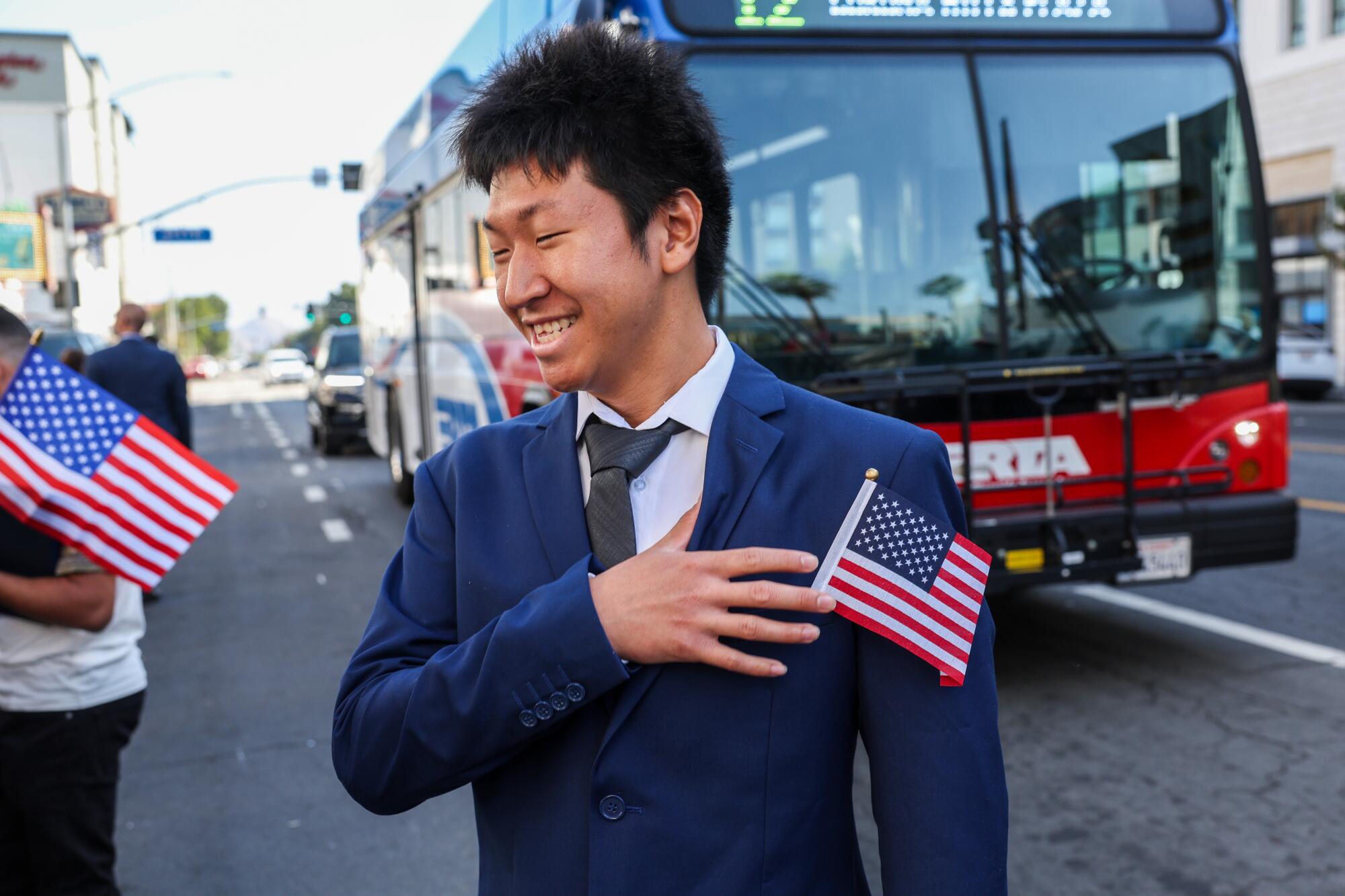
The students learn how to register to vote, research candidates and fill out a ballot.
“Instead of candidates, we put La Chilindrina, El Chavo del Ocho,” she said, referring to popular Mexican television characters. “They get to vote and they get their little sticker. We tell them you don’t have the privilege to complain if you’re not participating.”
The average processing time for a citizenship application was cut in half from a record high of 11.5 months in 2021 to 4.9 months this fiscal year, according to U.S. Citizenship and Immigration Services data through July 31. A decade ago in 2014, it also took 4.9 months on average to process a citizenship application.
In the wake of the pandemic in 2020, the backlog of citizenship applications ballooned to nearly 943,000, according to a Boundless report.
The COVID-19 pandemic bogged down naturalization processing at U.S. Citizenship and Immigration Services.
The speedier processing is the result of an effort by the Biden administration to cut through the backlog.
U.S. Citizenship and Immigration Services began prioritizing naturalization applications, accepting online applications and increasing hiring. The agency also rolled back Trump-era policies that tightened eligibility criteria for fee waivers, making it easier for low-income immigrants to apply for free, and expanded public engagement about the naturalization process to reduce the flood of applications around election years.
Elvi Cano, 56, waited six months after applying before she obtained citizenship in December. Cano, a film and event producer in Los Angeles, moved to the U.S. 18 years ago from her native Spain. She applied to naturalize as soon as she became eligible, she said, because she wanted to vote in November.
Trump’s threats of mass deportation — including suggestions that he would attempt to deport immigrants in the country legally — also concerned Cano. Permanent residents can under certain circumstances be deported.
“Given the current political climate, it was a significant moment in my life to be able to vote for the first Black woman as president,” she said. “I wanted to have everything done and ready for when the moment came.”
Outside the Riverside citizenship ceremony, Melisa Castro with the Republican National Hispanic Assembly handed out pocket copies of the Constitution and fliers that spelled out Republican values in English and Spanish: “Protect parental rights, restore public safety, lower taxes and protect unborn lives.”
She said her group helps people register for whatever party they want, “but we are conservative.” A lot of people had registered to vote by Thursday afternoon, said Castro — some as Democrats but the majority as Republicans.
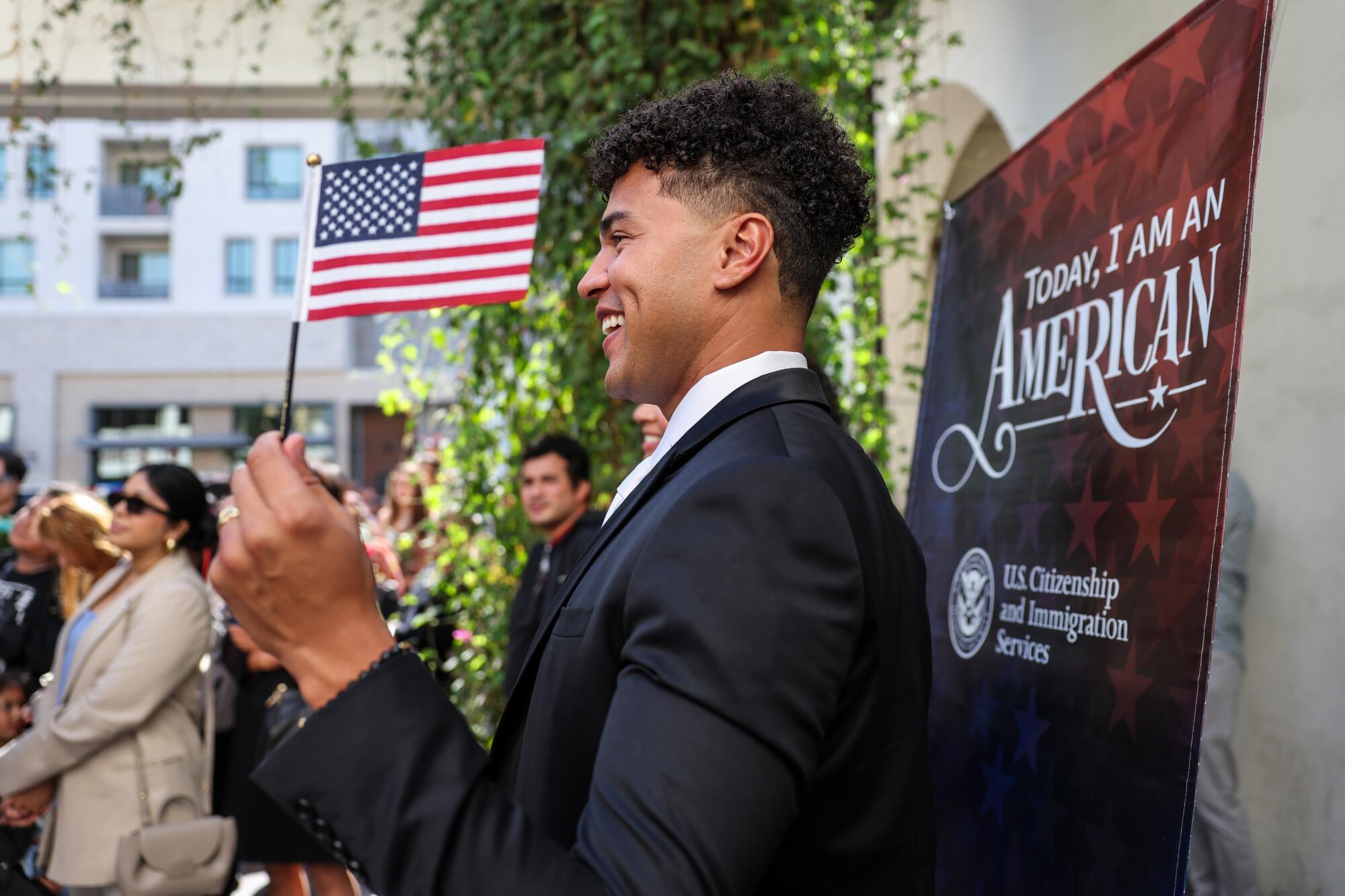
Others, such as Kevin Teh, were undecided on whether to vote. The 54-year-old from Chino said he went to an American school in Taiwan and came to the U.S. to finish high school and attend college.
Teh said Trump’s talk of mass deportations concerns him, but he said he likes that the former president supports tax cuts, and noted that his rent has risen from $2,000 to $2,800 in three years. He thinks Harris would better improve social benefits such as Social Security, disability and unemployment.
Still, neither candidate is as strong as he’d like on healthcare.
“I don’t really want to vote just for the sake of voting,” he said. “I’d rather have someone who really will do the right job for all the citizens.”
More to Read
Get the L.A. Times Politics newsletter
Deeply reported insights into legislation, politics and policy from Sacramento, Washington and beyond. In your inbox three times per week.
You may occasionally receive promotional content from the Los Angeles Times.
